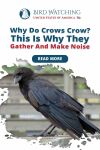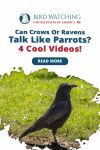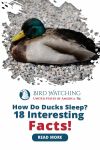
What’s this post about?
Our feathery companions are capable of so much more that we give them credit for. Birds generally display qualities formerly associated with humans, such as deceit, manipulation, cooperation, teamwork, compassion –and clever interspecies communication.
Ducks are one of the smartest birds and the intellect that underpins it interacts, feeds, courts, reproduces, and survives is astounding. There are facts that will have you regretting ever calling your best friend a ‘bird brain’. If only you knew better, it was actually a compliment.
A duck is able to imprint on species creating special bonds with them using the concepts of ‘same’ and ‘different’. They sleep and travel smartly, displaying clever defense mechanisms. A duck also cleans itself through various activities like blowing bubbles in the water.

Abstract Intelligence
According to recent research from the University of Oxford, ducklings are capable of abstract reasoning.
The notions of “different” and “same” were discovered to be understood by ducks. Ducklings may learn to follow around the first moving item they see, which is generally their mother. This behavior happens within 15 minutes after hatching and is commonly known as imprinting.
Importance
Scientists claim that the capacity of day-old ducks to think abstractly, which was previously considered to be the realm of higher animals or humans, is a defense mechanism. For safety, such a little, defenseless animal needs to be able to stick close to its parent, which imprinting can offer.
You would think, why ducks need abstract concepts when others don’t? Survival strategies and staying near parents is what every newborn does. Several other species do not have an issue as ducks have. Unlike other animals, ducks are able to function in different ways all of which need to be registered by the child.

Ducks can move on the earth, soar in the sky, and swim in the water. As a result, baby ducklings view their parent as a changing form. If the young ducks memorized a certain form or appearance, they would soon lose track of their mother and get lost. The ability to imprint makes them smart enough to cope with this situation.
Experiment
While ducks cannot talk, observing their actions may be an acceptable replacement for assessing their ideas. The result of this experiment shows that it is time to discard the tired cliché that intelligence is unachievable without speech.
The ducklings in Martinho and Kacelnik’s investigation were exposed to a pair of tiny, brilliantly colored objects that hovered over their pens 24 hours after hatching.
Certain pairings had matching forms, such as two spheres, and some had mismatched ones. This was the “priming phase” for a “same-different” test, according to the experts.
- Newborn mallard ducks, for instance, who were first introduced to two spheres (the same), subsequently preferred to follow a set of triangles (the same) instead of a cube and a cuboid (different).
- Another duck imprinted on two spheres of the same brown color. Later, when given an option between two blue spheres and a pair of the blue and yellow spheres, it chooses the two same-colored blue spheres.

This learning is crucial for the juvenile bird’s survival as there are many birds that look similar to their mom. They need to analyze what is different and what is the same to know their actual mom. This is what makes them smarter than most species.
They can sleep with one eye open
The brains of ducks are divided in half, with one half regulating one eye and the other controlling the other.
Have you ever observed your duck sleeping? You’ll notice that their head is usually tucked under their wing, with one eye shut and the other open. They’re genuinely sleeping. Because their brain is divided, they may be able to “switch off” part of their mind to slumber, whereas the other half stays active.

When ducks congregate around a lake overnight, those on the ends of a row are much more likely to maintain one eye open and be alert, as well as the corresponding brain hemisphere, than those in the middle, who confidently close both eyes.
PRO-TIP
If you see a duck’s head tilted upwards, know that they scan the skies for flying predators in this way.
Importance
Sleeping with one eye open is a defense strategy for the birds. It allows them to catch up on sleep and rest, especially after long migratory flights, while remaining conscious of possible predators. There are several animals that would want to devour a duck, including alligators, ospreys, and bald eagles.

Others Features and Behavior That Show a Duck’s Intelligence
Ducks are highly clever creatures with intricate social structures. There are several physical characteristics and natural behaviors that a duck exhibits that support its intelligence. Let’s look at some of the most prevalent duck habits, as well as the reasons for them.
Eye Placement
The position of a duck’s eye is essential in the conduct of traveling in a row or in a straight line, which is typical in all varieties – wild and tamed. The duck at the front of the line maintains a watch on the front, while the ducks behind them constantly examine the landscape surrounding them sideways for dangers or meals.

DID YOU KNOW?
Duck eyes are locked in their sockets, so they must tilt and rotate their heads around to look in multiple directions.
Blow Bubbles in Water
The smartness of a duck is not limited to the features that it has been naturally blessed with. There are quite a few behavioral aspects that display how smart a bird is.
A duck may occasionally lower its face into the water and forcefully exhale, sending bubbles into the water. By doing so, they clear out their noses of any dirt, feed, feathers, or other debris.
Preening
When a duck comes out of a pond, it begins to preen nearly immediately. This duck activity might last a few seconds or up to 15 minutes as they disperse the natural oils that help keep their beautiful feathers waterproof across their body and help them dry off.
The preening gland is found near the base of a duck’s tail. The process of preening activates the gland, causing it to produce oils. It is these same oils that make it easy and quick for water to slide off their backs.

If the exterior feathers, as well as the down beneath feathers, remain damp, the duck will get cold and unable to keep warm. This frequently results in the duck fearing all contact with water, causing more harm than good.
If a duck gets its feathers filthy and is unable to clean them, the mud will prevent the oil from working. Parasites can then develop as a result of this.
Head Bobbing
Being able to communicate through mere bobbing of heads is another example of the duck’s smartness. A simple difference in direction of the nod can change the entire meaning. When the duck is happy or excited, it will bob its head up and down. This can be due to several reasons:
- A duck friend approaching
- Tasty treats received
- The water is nice and fresh

When they bob their head sideways, understand that this is not the cheerful bobbing. It is instead an angrier appearing side to side bobbing, generally having her head dropped.
This is more of a scolding, and one of the top female ducks is typically the one to do it.
Safety in Numbers
Ducks are intelligent enough to realize that they are better off with the support of other companions. By increasing the number of eyes scanning for predators and therefore lowering the danger of predation, adding extra members to a brood may enhance survival.
As mentioned before, ducks use numbers to their advantage while resting. Some birds sleep completely while others on a lookout keep half their brain alert. The fascinating thing, however, is that even juvenile birds that have not yet adapted to anything are aware of this as well.

Amalgamations are most common in the first week of life when ducklings are most friendly and have not yet formed strong ties with their parents. Ducklings from various families frequently congregate while eating, interacting aggressively with other family units, or escaping predators.
Eating Habits
Ducks locate, grip, and swallow food in one large swoop using their beaks. They also utilize it to screen out unnecessary water and inedible items, leaving only the food they’re looking for.
A duck’s beak has a sensitive edge that they utilize to feel for food, much like a finger. Ducks have a nail-like growth on the tip of their beaks as well. This may be used to hook or move food or other things.

Ducks will consume everything with a beak, including seeds, grains, plants, frogs, salamanders, and crawfish. Ducks have certain instruments to aid digestion, even though they swallow their meal whole.
The gizzard, which breaks down food, is one of them. Ducks also eat grit, which is a small stone that is kept in the gizzard and functions as an extra grinder.
Ducks compared to other animals
When you consider all of the animals in the world, you immediately discover that birds are some of the cleverest species we have on the planet.
Different birds utilize a variety of techniques to defend, clean, eat, and communicate. We’ve previously demonstrated how intelligent ducks are; now, let’s compare them to other birds to discover how they vary.
Ducks vs. Chickens
Ducks tend to be more intelligent and charismatic than hens. Ducks are nearly always less damaging to flower beds and gardens than hens are.
Ducks do not scratch and bury themselves in a plethora of holes. Ducks seldom indulge in the same hole digging antics as other poultry birds unless there is a mud puddle to burrow into when looking for insects to eat.

Ducks are simpler to restrain in basic enclosures, but chickens are notorious artists that seem to find a way out through any opening. Ducks and chickens confined in a garden can be effective pest controllers, although ducks are sharper slug and snail searchers than chickens.
Ducks vs. Ravens
This lovely bird is renowned for its ability to discern the source of a problem and how to fix it. Just like ducks, even ravens believe that safety is in numbers. Where does the difference lie, though? While ducks use collaboration to defend themselves and keep a lookout for predators, ravens use it to attack.

They’re shrewd and cooperative hunters that frequently work in teams, with one distracting their victim while the other snatches an egg or a young animal. Regardless of the intent, it takes quite a bit of intelligence to be able to manipulate, deceive and communicate like this.
Ducks vs. Pigeons
Pigeons ingest a lot of grit when eating their seeds and shells. Pigeons, like ducks, enhance the efficiency of their gizzards by ingesting stones and pebbles, which are retained and used as grinding surfaces.

Pigeons can defend themselves and notify people around them by making a piercing, whistling sound with their feathers.
While they may not appear to be very clever creatures, they have enough instinct to maintain their communities as secure as possible, given the circumstances.
When a bird is terrified into the flight, it makes a whistling sound that signals danger.
Ducks vs. Jays
Because ducks frequently feed in predator-infested regions, it is often beneficial for the birds to ‘eat and flee’. As a result, ducks have higher storage capacity in their esophagus, allowing them to transport far more food from foraging regions than they might typically consume.

Ducks may be clever, but Jays are considered just a level above in this case. When they store food, the storage is not dependent on the mere capacity of the esophagus. They will anticipate what sort of food they want for breakfast the next day, its quantity, and where they will acquire it.
Keep Reading!
There isn’t a debate on which bird is the smartest. The fact of the matter is that birds have features and characteristics that allow them to survive in the world. It is these survival tactics that make them clever.
Ducks are able to imprint, communicate, defend and feed themselves, displaying traits that we previously just associated with humans. They can differentiate between the things they see. They can protect themselves from predators while sleeping or walking in a straight line.
Now that you know how smart ducks are read how pigeons are able to act as messengers . Are they that smart that they know directions like a GPS? Read to find out.
The Fascinating Reason Messenger Pigeons Know Where to Go
Amazed at how a messenger pigeon knows exactly where to go? They have fascinating navigation abilities that you should know about!

By David A. Swanson
Bird Watching USA
My name is David and I'm the the founder of Bird Watching USA! I started Bird Watching with My father-in-law many years ago, and I've become an addict to watching these beautiful creatures. I've learnt so much over about bird watching over the years that I want to share with the world everything I know about them!

David A. Swanson
Bird Watching USA
My name is David and I'm the the founder of Bird Watching USA! I started Bird Watching with My father-in-law many years ago, and I've become an addict to watching these beautiful creatures. I've learnt so much over about bird watching over the years that I want to share with the world everything I know about them!









